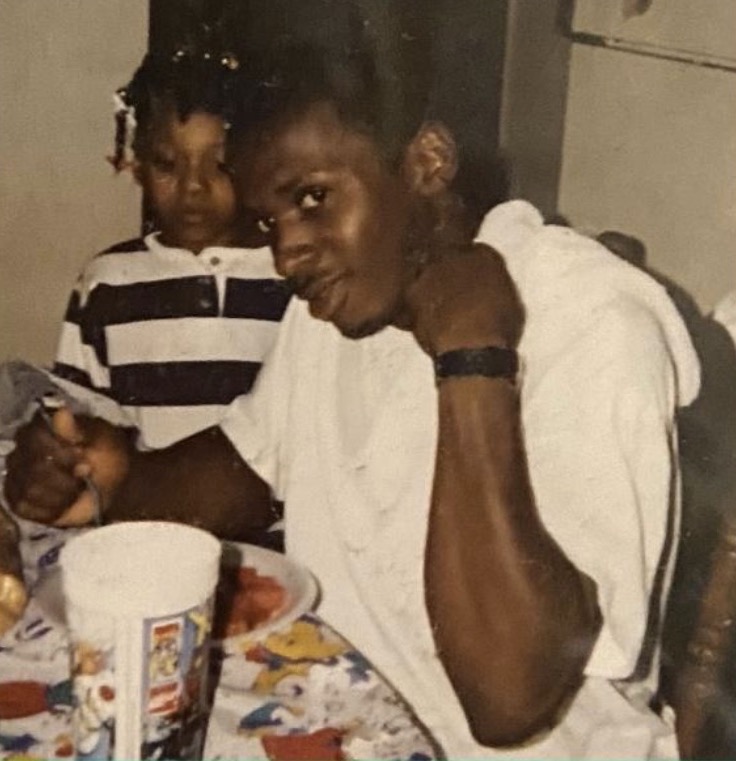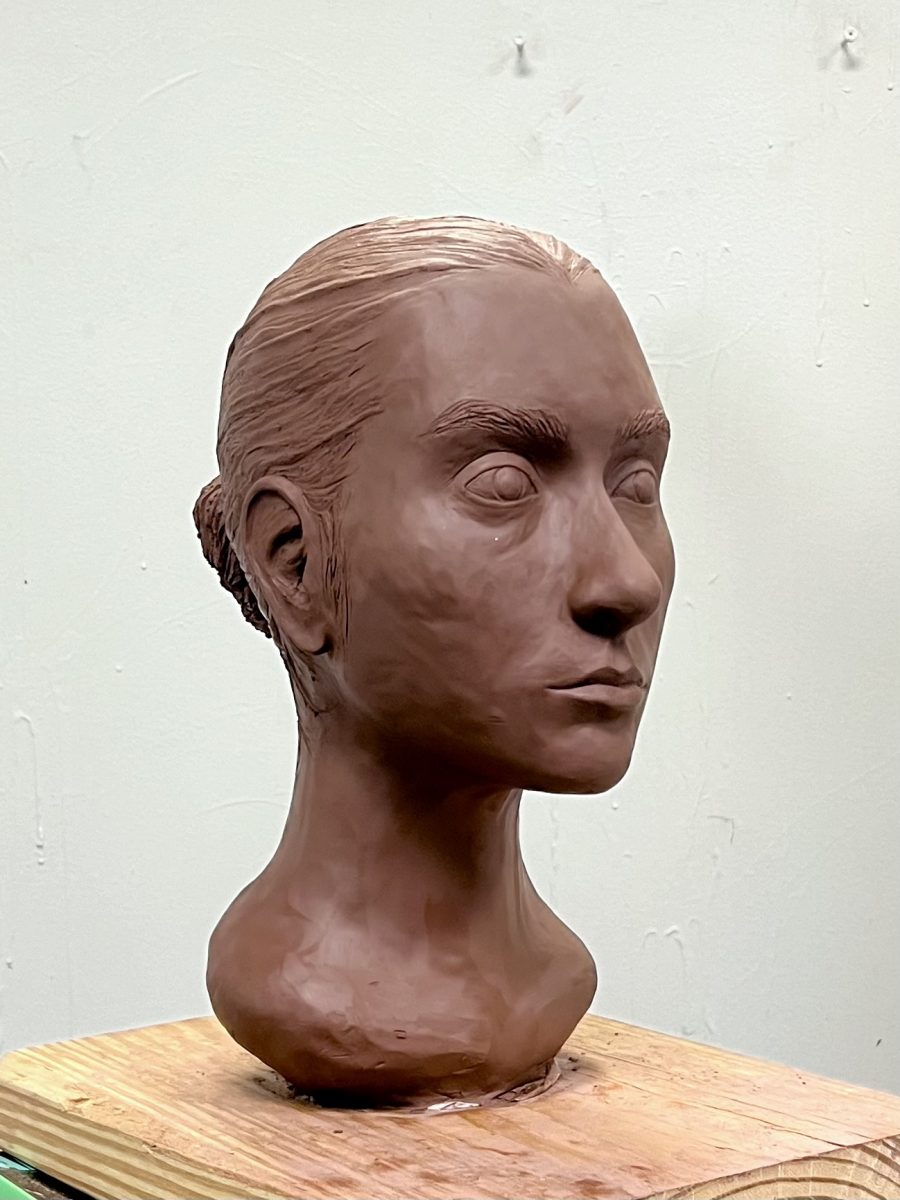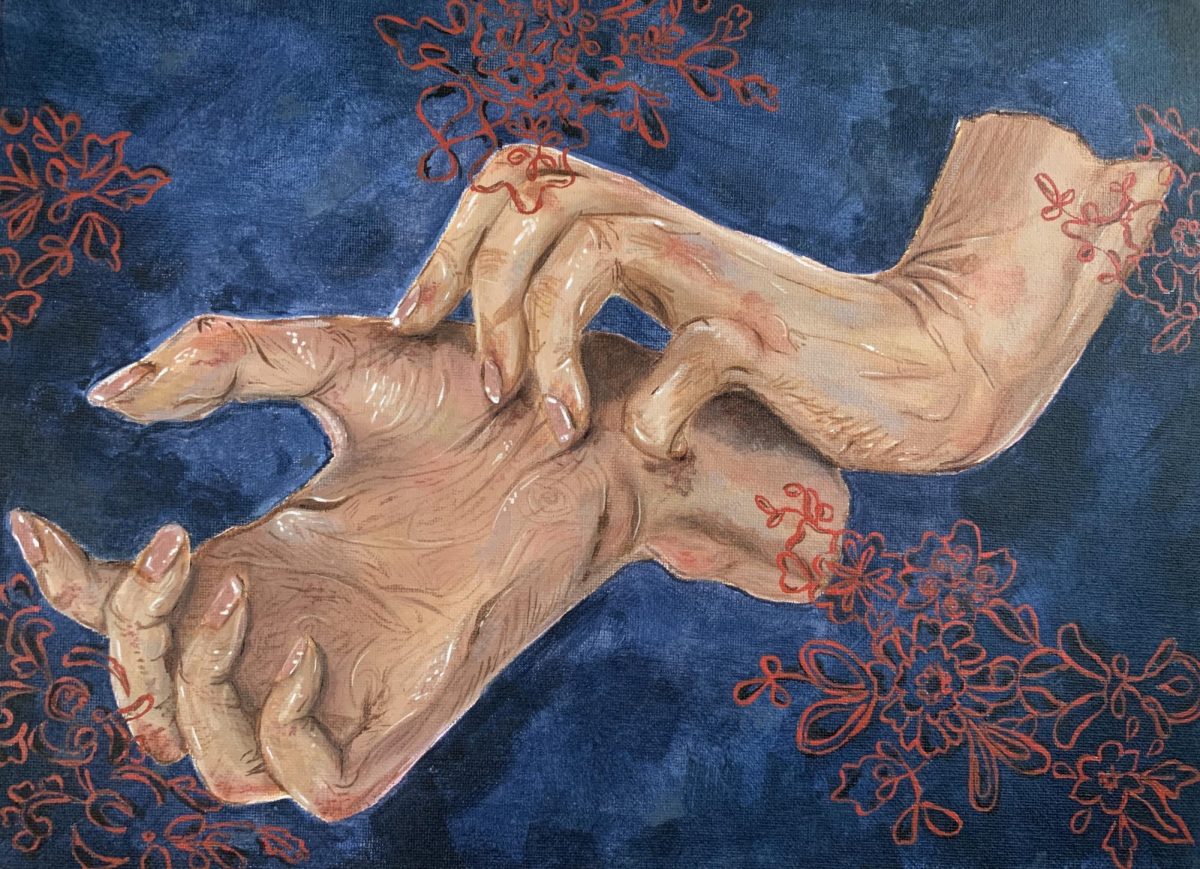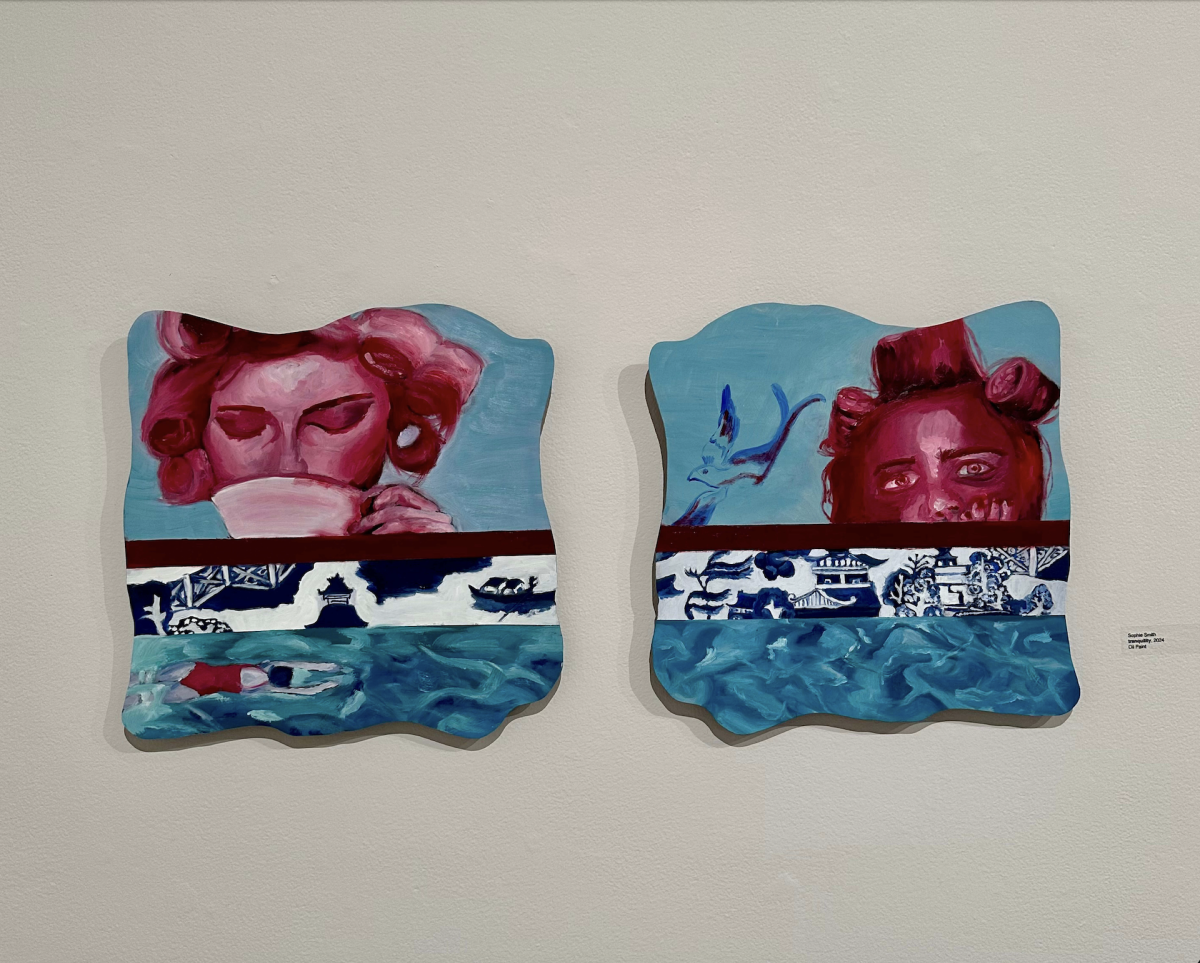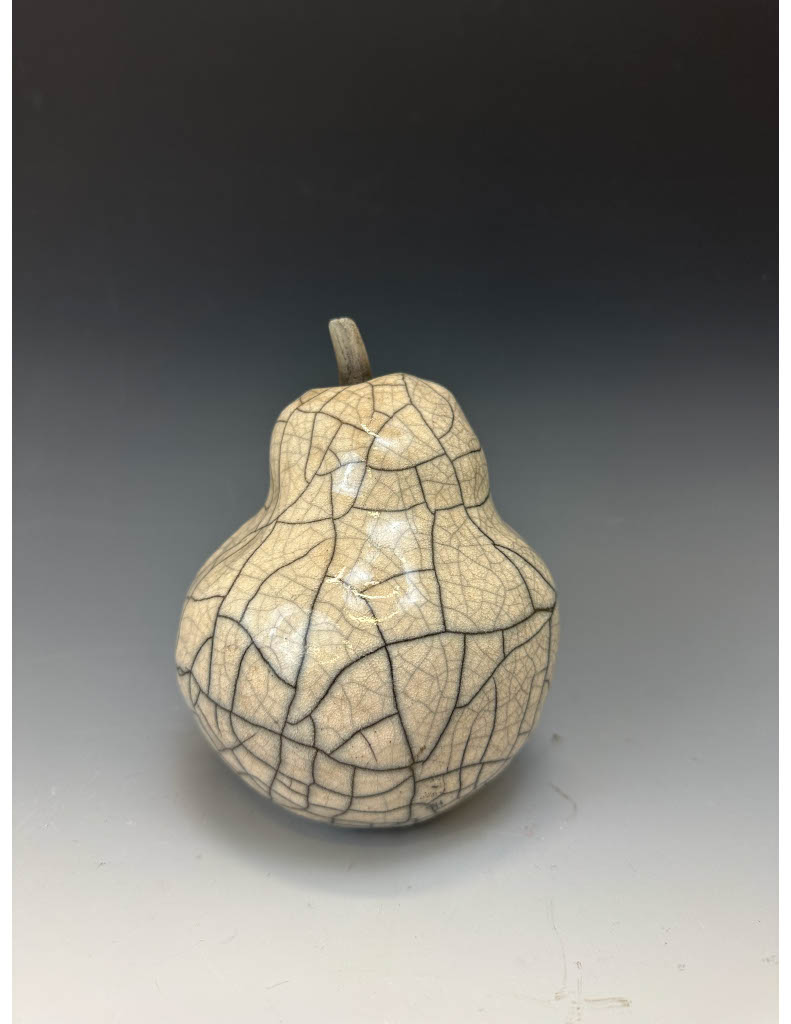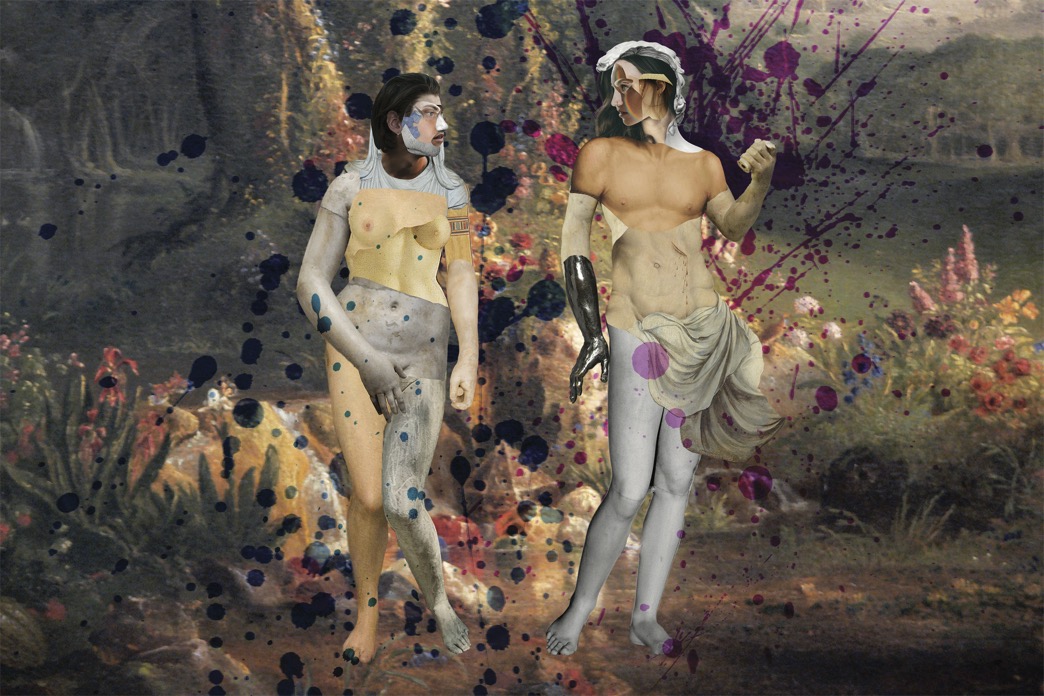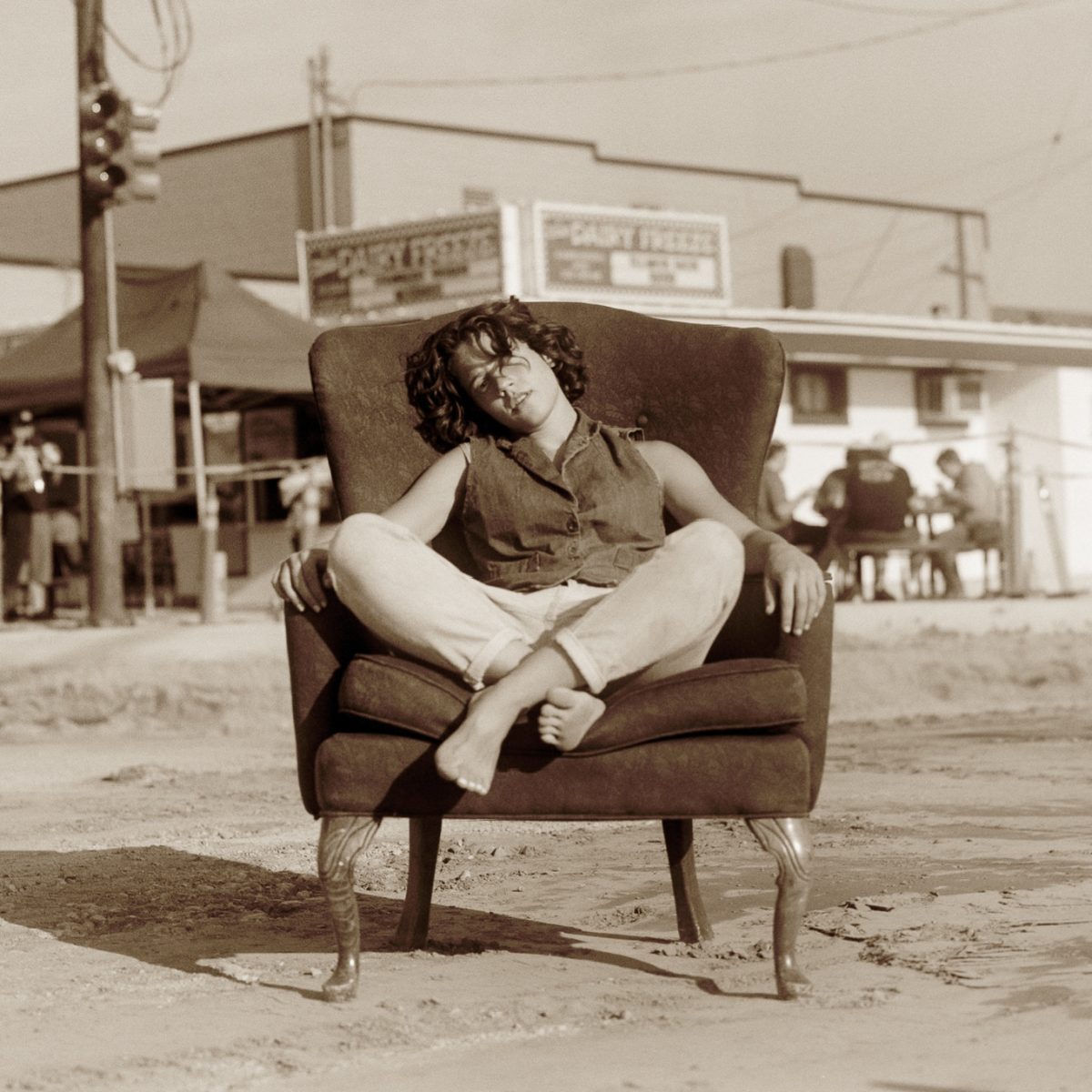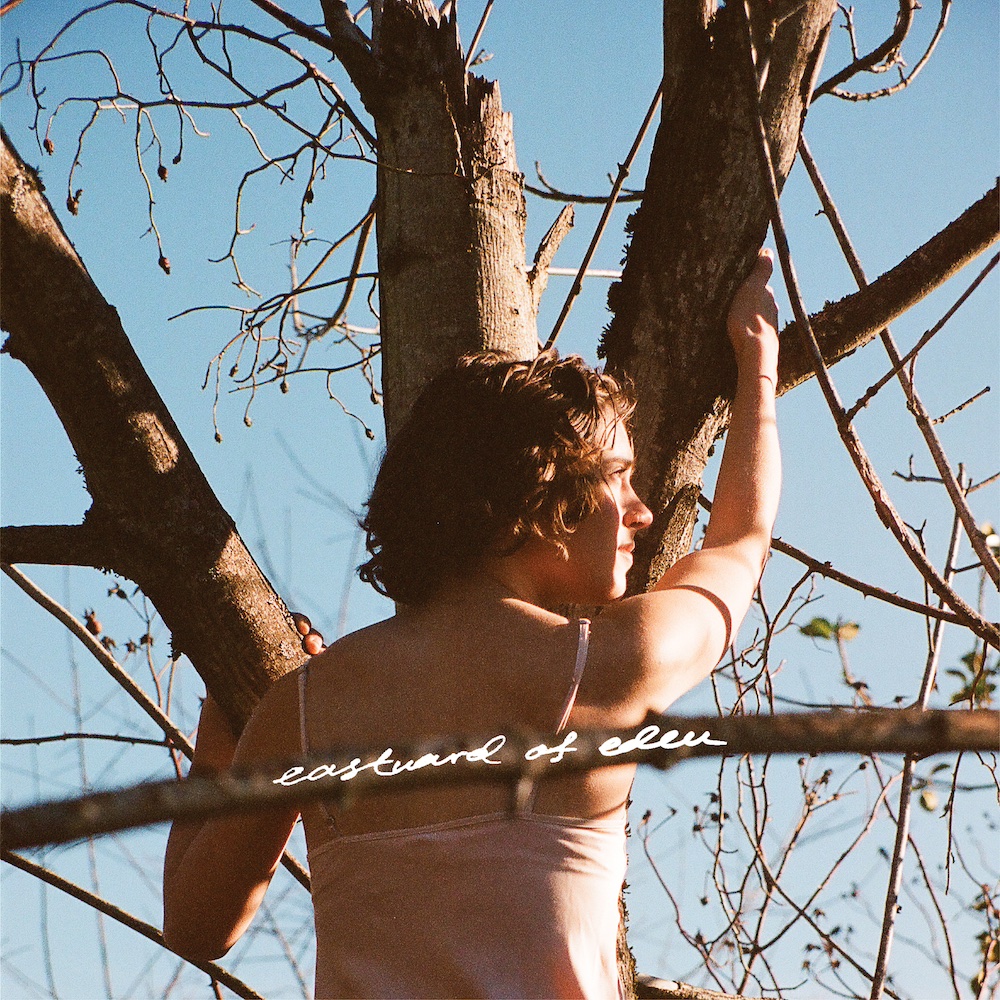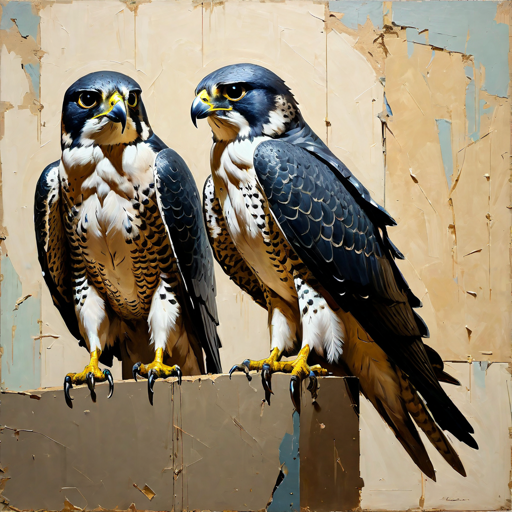The two girls were the only living things in the hall, and they stood two feet apart, squinting through the dimness of the aerial exhibit. The peregrine falcons seemed to watch them in return with their hollow glass eyes. They swooped motionlessly on wires, their sleek feathers mid-ruffle and their taxidermied claws poised for an attack—perhaps at Eri, if the falcons were still alive.
Eri did not know why the other girl occupied the same display when there was so much space to go around. Eri also did not know why she had not chosen to move herself. She remained in place, hands toying with the handles of her tote.
“They’re beautiful,” she said. It broke the silence like the crack of an eggshell. It happened abruptly enough that she regretted saying anything at all.
The girl didn’t pull her gaze from the falcons, but she answered clearly and gently, with the air of a morning birdsong. “Even though they’re dead?” she asked.
It made no difference to Eri, but she said, “Yeah.”
The girl smiled faintly. “What makes them beautiful?”
A litany of answers flurried through her mind like the flipping of pages. The peregrinespossessed such stark, striking plumage, cast in shades of earth, bark, and foam-crested cliffs. Their streamlined bodies told of their history as predators, hunters of old, evolved to cut through both air and flesh. Even beyond generalizations, these particular falcons lived in facsimiles of the undisturbed wild, nesting ashore the temporal sea. They were nature cast beyond the bounds of entropy, birds of prey turned prey. The words drifted about like the ones she turned in for her literature papers, but her studies were the last thing she wished to think about now, so the words reshelved themselves.
“They’re the fastest creatures in the world.” Eri had not needed to read the placard to know it. “Two hundred miles per hour.”
“They use gravity to dive that fast. I’d say that’s cheating.”
“So it’s a contest?”
“No, but I find that there are often winners.”
Eri ran her eyes across the faux forest floor, where the mice scrambled for cover. “Who do you think should be winning then?”
The girl crooked her head toward the other end of the hall. “Back over in the mammalian wing, African section—the cheetahs. They’re the fastest runners and they manage it with nothing but the speed of their limbs.”
“I didn’t peg you for a cat person.”
“I’m really not.”
Eri raised her brows at her. “Really?”
The girl leaned in closer to the falcon display. “I do love birds.”
Amused, Eri agreed. “Me too.”
Then she finally met the other girl’s eyes. Within, she saw the glimmers of excitement dancing like fireflies, blinking into view just long enough for her to reach out and catch.
“I’m Eri. What’s your name?”
Her pale lashes flitted against her cheeks, almost shy. “My name is Ninnerl,” she answered, her fingers playing with the ends of her too-long sleeves.
Eri didn’t get the chance to say anything else when something clattered against the paneled floor. The sound echoed down the hall. It was a light one, truly, only startling because of the existing quiet. She bent down to pick it up and dangled it from her fingers, a beaded bracelet that had slipped off Ninnerl’s wrist.
“Here you…” When Eri looked up, Ninnerl had vanished. “… go.”
Then she became the only living creature in the hall.
She exited the exhibit and walked briskly into the museum’s central atrium. As her eyes adjusted to the sunlight streaming through the ceiling, Ninnerl still did not reveal herself. Eri pursed her lips. She ran her fingers along the cheap plastic of the beads, thumbing the coarse string that threaded them in a pattern of turquoise blues and pearlescent whites. It was nothing exquisite, only cheap plastic and an overtired knot. But as she gave the atrium one last search, she slid the bracelet onto her wrist anyway. If Eri came across the girl again, she would return it.
She never did get the chance though.
–
Her phone rang. That was odd, as Eri had set it on do-not-disturb before she began studying. Only her parents’ numbers were allowed to bypass it, and a No Caller ID would certainly not.
Guiltily, she picked it up, too curious not to. “Hello?
“Eri!” the voice responded, delighted. And musical like birdsong.
Eri’s pencil almost slipped out of her grip. “Ninnerl?” she said, then quieter, “How did you get my number?”
Ninnerl went silent for a moment, spoken for only by a low hum of static. “In a sense, you’re the one who has my number.” Eri frowned. “But I don’t.”
“If you don’t want me to bother you again, I won’t,” Ninnerl said.
Eri stood, sending her chair rolling into her bed. She winced before pacing within the small space between her bookshelf and her door. “No, I don’t.” She stopped in place. “I mean, I don’t want you to not call me again. I just don’t understand.”
When the static washed in, Eri found herself pacing again.
“Do you like bones?”
She almost tripped over her backpack. “I’m sorry?”
“Bones,” Ninnerl repeated. “Skeletons. Fossils. Remnants. Bones.”
Eri had not a clue what to make of that. She lowered herself slowly onto her bed, cradling her phone to her ear. “Yes, I do. Like them. I have many of them after all.”
Ninnerl laughed softly. “So do peregrine falcons.”
Eri wasn’t sure what to say, only that she didn’t quite want the conversation to end. “How many?” she decided, before cringing at her inane question.
The other girl took it easily. “Once I got bored and tried counting them at the museum, but I got three different numbers the three times I tried. I guess I can say they have many as well. Many smaller bones—hollow ones. They have to be hollow to fly.”
Eri could just recall it, the stout, squat frame of the falcon in a hall of skeletons. That little creature didn’t fly any longer. It perched among a choir of the other dead and emptied.
Ninnerl murmured, “Do you find that falcon beautiful too?”
Their thin bones would break easily with a twist of her fingers, having aged to brittleness. The bird was without eyes or ears, feathers or talons. It had been stripped of even its heart.
“Yes,” Eri said. “They endured even after all else rotted away.”
–
Eri knew about bones. All two hundred and six of them. She knew them every day, in the creak of her parents’ joints when they returned from work. She knew them in the tiredness that had nowhere else to go but deep beneath skin and flesh and blood. She knew them intimately in her chest, where the cage around her heart threatened to crumble with each worthless beat. Then there were things she did not know. She did not know how her bones might break if she walked out into traffic and the car could not brake fast enough. She had no idea if it would hurt as much as she would deserve. If she might find herself comatose, hopefully for a little while, or simply, dead. Eri wondered why her bones did not ache more with the whole ordeal—living.
This, this world, this living. She did not belong within it. She felt it, even deeper than the bones.
Still, Eri trekked home. No crashes. She toed off her shoes, drudged up the stairs, and shut herself away in her room. She tried to study, but more importantly, she waited. The phone call became the only thing she looked forward to every day, over all else.
“I have always wanted to fly,” Ninnerl told her.
“Like a pilot?” Eri rolled onto her back, imagining contrails streaking across her ceiling.
“No, I think I would crash the plane.”
Eri tossed back her head and laughed. “I have faith that you wouldn’t.”
“I appreciate it,” Ninnerl huffed. “But it wouldn’t be an airplane, or any other machine. I want to be just me and the air.”
Eri smiled as she stretched out her arms like the wings she did not have. “Why flying? Why not running? Or swimming?”
Ninnerl would tell her of the myths she wished to live, a different story every night. She longed to ride wyverns, hippogriffs, pegasi and alicorns, dragons of Wales and the lòng of China. She wished to see phoenixes rise from their ashes and thunderbirds striking across the sky. She dreamed of cockatrices and griffins, the roc and the alicanto, Minokawa and Gandaberunda. She loved creatures that flew, and she loved to tell stories. Eri loved to listen to them, soaking in Ninnerl’s boundless imagination. She herself only ever excelled at drawing from the real world.
“What about the birds?” Eri asked.
“Which birds?”
Eagles, hawks, ospreys, and kestrels. Crows and cranes. Penguins and peacocks. The rare macaw brought from the Amazon to the city zoo. The owl at the edge of the forest. The vulture circling the corpse left by the road. Ninnerl never told any stories about them.
“You liked the falcons at the museum,” Eri said.
“I did, certainly, but they weren’t anything special. I suppose you think otherwise.”
“I don’t particularly think anything.”
“And I don’t believe that.” Her voice seemed to lean in. “Come on. What makes peregrine falcons special, Eri?”
She turned into her pillow as she mulled it over. Eri spoke in a slow, tentative cadence. “They persevered when faced with extinction. The falcons that built their nests along cliffs now build homes atop skyscrapers. They adapted, they rose with us, and they stayed. They aren’t mythical, but still, they’re the swiftest beast in the sky. They fly, and we can only wait and watch.”
Ninnerl contemplated it. She and Eri were alike in that way, slow and thoughtful, but she found that Ninnerl’s silences held a sort of solemnity, as if every word required heavy inspection before being set free.
“I can’t disagree,” she said.
“Good.”
“You have a creative, artful soul.”
It was enough of a non sequitur that Eri had to pause before she stammered, “What?”
“You are charmed by every little thing.” Ninnerl’s voice was soft, like the coo of a mourning dove. “Your heart is so open.”
“Well,” Eri said, as that very heart warmed at the affection in Ninnerl’s tone. “Don’t you think the heart is made to feel?” “How much would you say?”
“I don’t know,” she answered frankly, and Ninnerl let her think, a gesture Eri had come to cherish. “I would think, as much as you want it to. Everything, the world, with its birds and its stories, can feel very beautiful—be very beautiful, if we let it.”
Ninnerl hummed, sending a light rumble through her phone speaker. “The world can be beautiful, of course, but I think too many disallow it for the rest of us.”
Perhaps that was the reason Eri never quite believed she belonged in this world. She herself was the one thing she could not allow to be beautiful.
–
It was special, a dear and intimate thing—calling someone at night, in the dark, their voice in your ear as you curl up in bed. The background of static noise vibrated like the electricity of thrill. Eri should not be talking with this peculiar stranger-not-stranger, but she was. The world condensed into the space between her and the phone, and it was beautiful to her. She was so drawn to it, and gradually, it drew her out.
Eri found her old sketchbook, buried in the corner of her one crooked shelf. The cover was more crumpled than she remembered, and the pages were only a little more than half-filled, many unfinished. She flipped through the drawings of people she knew, people she didn’t, people she couldn’t remember truly existed, who came to her in dreams. She lingered on everything else. Branches of flowering trees, keys to nowhere, mice and pears, old clocks. They crinkled under her fingers like fallen leaves.
She could barely focus upon discovering them. She still had some time before the museum closed. After much thinking, Eri tucked the sketchbook and a few charcoal pencils into her tote bag. Then she went down to fetch her bike.
It was busier today, a weekend, so Eri was not the only living thing in the hall. The peregrines, though, were as they were before, embedded in shards of frozen time. She chipped them out with her pencil, piece by piece. She scratched out a body, a blur in the air. She shaded in open wings that tilted toward the lamplight sun. She rendered a feather, then dozens more. She filled its roaming eyes with charcoal and left behind a glint of life. Though her pencils lacked the pigment to yellow the beak or muddy the plumage, they dutifully speckled the underside from coverts to fanned tail. Her eyes flickered between sketch and diorama. On Eri’s piece, the claws were sharper. Eyes keener. Shape more lithe and not a single feather out of place. Eri fumbled through her bag for a moment before realizing she never packed her eraser.
She repeated it all two more times before her feet began to protest, and she found herself a bench to sit on. Charcoal dusted her hands and three birds populated her white sky. Just like that, they were alive again. They were a little different, but Eri liked them all the same.
On the adjacent page, she tried sketching Ninnerl, but she had long since begun to forget what she looked like. What she remembered she remembered in bursts of colors her pencils still failed to capture. Ninnerl’s skin was a warm, golden tan, as if she was bathed in the light of a perpetually setting sun. Her hair was a pale, solar shade, like the very rays themselves. She had simply radiated all over, bright eyes and easy smile. Eri thought herself a shadow in comparison.
As she biked home, she wondered when she would see Ninnerl again, but she knew better than to ask.
The lights were already on when Eri entered the apartment. They had gotten home early. Her heart sunk and slinked off, hiding in the gutter outside.
“Where have you been?” Mother asked in their native tongue.
“Only the museum.”
“You expect us to believe that?” said Father.
She was shrinking, like a mouse under talons.
“You don’t leave the house without asking. Was it a boy?” Mother pointed a crooked finger at her. “No daughter of mine is becoming a whore.”
“It was not—I’m not—”
“We’ve heard you on that phone of yours, laughing at night!”
“And what of your studies?” Father leaned a tired arm on the kitchen table. “Staring at some old junk will not help you pass your exams.”
His disappointment clawed at her. Eri ducked her head. “I’m sorry.”
“You must focus on school.”
“I understand.”
Her father rubbed his forehead. “Don’t do it again. Go to your room.” Eri unclenched her hands and stepped past them.
Mother grabbed her arm, fingers tight as a cuff. “What is this?” She lifted Eri’s hand, where charcoal caked the sides of her palms.
“Just some dirt,” she said. She tried to pull herself free.
Mother was already reaching for her bag. She took out the sketchbook and handed it to Father. Eri hung her head as he flipped through it with aching slowness.
“I’m surprised you still have this,” he said tonelessly. “You did this all yourself?”
“Yes.” She raised her head a fraction.
The sketchbook was open on the spread she worked on today. Falcons on one page, girl on the other.
“It’s not bad,” he said.
“Thank y—”
Father tore the page in half, and a choked gasp tore out of her throat. He cleaved apart the rest, ripping the book into two. She watched uselessly as the spine dropped to the floor, and its shorn ribs fluttered down to join it.
“A waste of time,” he spat. “You are lucky we don’t throw you out onto the streets.”
A multitude of thoughts blazed, scorching her throat and threatening to burst from her, but she let them stay there. She fled to her room and threw herself onto her bed instead. She had hoped that now that she was older, her parents wouldn’t act like this anymore.
Eri reached for her phone. She only knew one person who might listen, who might understand, but her hand stilled before it could reach her pocket. Ninnerl never gave Eri her phone number.
Eri pulled her covers over her head and curled up beneath them, but it would do little to cover up the sound. If they could hear her laugh, they could surely hear her cry as well.
Her phone was buried in her drawer. It was barred from notifications and locked into silence, but still, she heard it ring.
Eri wrote a few more lines before she tossed her pencil on her desk with a harsh exhale. She dug out her phone and held it up by her face. “What?”
There was a pause. “What’s with that tone?”
“I should be studying.”
“You’re always studying.”
“I’m clearly not if I’m entertaining you right now.”
Ninnerl scoffed lightly. “Entertaining? Is that what this is?”
Eri clenched her jaw. “If you don’t have anything meaningful to say, I’ll be going back to always studying.”
“Wait,” Ninnerl said before she could end the call. “What’s wrong?”
Eri’s breathing shallowed. “I’m not answering that question.”
“Eri. I just want to understand.”
For a moment, she couldn’t even hear Ninnerl’s further pushing with the blood rushing in her ears.
“Please, what’s going on with you?”
Eri stared at the papers and numbers before her, half-completed work and all wrong, wrong, wrong. “I’m never good enough for my mother. I’m never good enough for my father.” She laughed, as if it would hide the tremble. “I just realized I’m not good enough for you either.”
“Why would you say that? What does that mean?”
Eri wrestled her fingers into her hair. Then she dropped her elbow to slump over the desk. “Was I ever your friend?”
“Of course, you’re my friend!”
“But are you mine?”
“Yes! Why wouldn’t I be?” The way she did not hesitate only served to incense Eri further.
The words fell out of Eri in a furious rush. “Why do you even talk to me?”
The response came in just the same. “Because I have no one else!”
Only angry breaths and the crackling of static pervaded.
“I see,” Eri said, and she hung up.
–
An apology was ready on her tongue the moment her phone sounded, three days late. It died there when she heard Ninnerl’s voice. “I thought I should call you, instead of leaving a voicemail, or something.” Its tiredness seeped through the speaker and down her palms. “Can I tell you something?”
“Yeah,” Eri could only answer.
“I wanted to be an ornithologist. Once, a long time ago.”
“What changed?”
“Nothing really changed. It was always just my dad.” Ninnerl clicked her tongue. “I never knew what hurt more. My heart, or the rest of me.”
Eri closed her eyes. She had made the guess, but it was the rare thing she wished she was wrong about.
“I hated everything. I hated my reality.” Then she continued in a whisper, “And at some point, I preferred myth. I could only find something close to beautiful in the spaces beyond and between. I hid within the pages of library books kept past their due dates and daydreams stolen during lunch breaks. I lived in the blackness before sleep and the blurred windows of the buses. And I call you with a phone I don’t own.”
“Ninnerl—”
“It would have been better if I had never been born.”
Eri’s mouth fell open uselessly for a moment. “Don’t say that.”
“My father often said I would never be as beautiful as my mother was.” Ninnerl’s voice crackled over the line. “And I do wonder if that’s why I have always been alone. If I hadn’t been born, he wouldn’t hate me. No one would hate me. Not even you.”
“I couldn’t hate you.” Eri ran a harrowed hand through her hair. She hung her head, staring at the floor. “Not you. You’re my friend.”
She could hear the gentle peak of a smile in Ninnerl’s voice. “You’re right.”
“And I want you to know,” she said softly, “that I think you are beautiful.”
She heard a breath. It could have been a stuttered one, tangled in disbelief. It could have been a sharp intake of shock. It could have been a sob. “Goodbye,” Ninnerl said, and she hung up.
–
Eri was running. Her coat flapped behind in a frenzy like clipped wings. Her parents had attempted to stop her, but still, she was too nimble for them, and at the same time, not nimble enough. She feared that she might be too late. She didn’t even know where she was going, but there was only one place she could think of to search.
She found her just before she made it to the museum. Eri skipped to a stop as she neared the end of the bridge. Ninnerl sat atop its stone balustrade, legs crossed. At the sight, Eri was hit with a secondhand sense of vertigo. “What are you doing up there?” she called out.
The other girl turned around with a start. Her windspun hair spiraled about her face, bracketing her wide eyes. “What are you doing here?”
Eri stomped up to her, a billion words buzzing and scratching up her throat. When she reached for Ninnerl’s arm to pull her off, her hand passed straight through skin and flesh and blood. It even glided past bone.
Her hand snapped back the emptiness she grazed. Eri thought she might have fallen off the bridge, with how sharply her world flipped right then. She blinked in forceful succession, as if that would help her make sense of it.
“Ninnerl, what—”
The girl shook her head, and Eri’s lips snapped shut. Ninnerl tucked her hands into her lap, shoulders bent in on herself. For once, there was no static to cover the void.
“Did you know that the peregrine falcon is the fastest animal in the world?” Ninnerl scanned over the horizon and the skyline that obstructed it, as if she might be able to spot their nests upon the distant rooftops. She shot Eri a cheeky smile. “Up to two hundred miles per hour.”
Eri swallowed. She leaned her forearms onto the balustrade. “You don’t say.”
“Humans can reach pretty high speeds too. When we dive, we can hit a hundred and twenty miles per hour.”
“Really?” She couldn’t figure what Ninnerl was getting at.
“I read that somewhere. I wasn’t able to get that fast. The distance from the bridge to the bottom isn’t far enough to gain much speed.”
Eri stared at her.
“It was the only time I got to attempt the jump, or at least I thought.” Ninnerl tilted her head down at the drop, a gorge with a thin stream slithering through it. She sighed. “As it turns out, there’s only one way humans can fly uninhibited.”
Eri followed her gaze, and the image flashed in her mind. Of the gorge and a broken body. The imprint lingered, burning her chest. She could hardly breathe after she made the realization.
“I left my father a voicemail. I waited for two full days,” Ninnerl said. “He never came to stop me.”
“I’m sorry,” Eri whispered.
Ninnerl still didn’t look at her. “You know, I did come back to haunt him. He was too drunk all the time, so it wasn’t all that fun. I gave up on that fairly quickly.”
Eri wanted to both laugh and cry. “How did you… How is this possible?”
Shrugging, Ninnerl said, “I don’t really know how it works. I just woke up one day, right here. It didn’t take me long to realize something was different. I became this body, without real bones or flesh or skin. Then, as I grew weaker, all I could do was talk, and somehow I started talking to you.” She tapped a touchless finger on Eri’s left wrist. “I think it was the bracelet.”
Her mind was still working to catch up. “What do you mean ‘grew weaker’?”
“In the beginning, I could go anywhere, do anything. After a time, merely being away from this city made me fade. Eventually, I found that I can’t be corporeal unless I am right here again.” Ninnerl’s timid eyes rose to hers. “You happened to meet me right before then, and now you’re meeting me here.”
It struck her then, how lonely Ninnerl must have been all that time.
“Don’t make it sound like that,” Eri said.
“Like what?”
“Like this would be the last time.” Eri sunk her nails into her sleeves, where Ninnerl could not see. “We’ve barely known each other.”
“We’ve known each other for an eternity, Eri.”
“A trickling one.”
“Only back where it came. We shouldn’t have met at all, you know.”
“There has to be something—”
There was not. All the pencils, new or sharpened, stubbed or broken, graphite or charcoal, could not rewrite her course.
The sun slid down in the distance, a single drop of sand in a cracked hourglass. The orange glow illuminated the weariness wrinkling Ninnerl’s brow but also the content awe in the way she softened.
“I’ve come to realize that at the very least,” Ninnerl said, “I can’t really hate a world you reside in. I can’t hate a world you have so much hope in.”
“You think too well of me.”
“And why is that so awful?” Instead of giving her a chance to answer, she went on. “You appreciate all the smaller things in life–the hues of a fallen feather, that one pencil that never breaks, the crooked shelf that sags just right. You even remember all of my stories that weren’t really mine. I admired that,” she said. “You’ve always kept your heart open, but it lets as much in as it lets out. You never allow any of the things you truly love to stay, and that is the only thing I believe you should do more, Eri.”
She ducked her head, where neither the sun’s rays nor Ninnerl’s pure understanding struck her so intensely.
“Still, I wished I could be a bit more like you. I suppose some part of me was. That part of me still wanted to live.” Her smile was a broken one. It cracked along her face, quivering under the weight of welling tears. “I still really want to, more than ever before.”
Eri squeezed her eyes close briefly as they stung. She stretched out her arm to wipe the tears from Ninnerl’s face, but once again, her hand phased through. Eri let out a shaky breath as she tried again. Then again. “I can’t—”
“It’s okay.”
Her hand trembled as she held it in the air. “It’s not.”
“I don’t have any more time. I have to go.” Ninnerl looked down past the bridge. “I have to go back there.”
Eri grasped her hand with her left, and this time, it took. Ninnerl jumped at the contact, and Eri could only exhale in relief. “Right now, you’re alive, to me,” she said, gripping her hand tightly. “So let’s take our time.”
Ninnerl was looking at her, then at their hands. She broke into a soft smile as her thumb stretched down to Eri’s wrist, where the beads clacked. “I made that bracelet when I was a kid. I wanted it to look like the sky. My own little sky.”
“It’s very pretty.” It was anchoring Ninnerl.
“Am I only beautiful in my death?” she murmured.
Eri squeezed her hand. “You never needed to be.”
Ninnerl chuckled, squeezing her back. “Maybe you’re right.”
Eri’s lips quirked up. She dragged the sleeve of her free arm over her eyes. “The gorge levels out some distance over there. I’ll walk you down,” she said.
“I don’t think that—”
“No more falling. No more flying. Let’s just walk.”
“Walk,” Ninnerl echoed. “Okay. I would like that.”
She climbed down from the banister. She held Eri’s fingers tightly, and together, they trekked down, hand in hand.
–
In the end, Eri held on to the bracelet.
